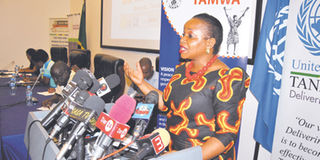Tanzania drops 12 places in World Freedom Index

What you need to know:
- According to the 2017 World Press Freedom Index (WPFI) report, the other factors that contributed to the drop are the suspension and closures of media outlets, especially during elections.
Attacks on journalists and state threats to media houses have played a major role is seeing Tanzania significantly drop 12 places in the new press freedom rankings, Reporters Without Borders (RSF) said yesterday.
According to the 2017 World Press Freedom Index (WPFI) report, the other factors that contributed to the drop are the suspension and closures of media outlets, especially during elections.
“The climate has not improved since President John Magufuli’s election in 2015. Nicknamed the ‘Bulldozer’, he tolerates no criticism of himself or his programme,” says the report.
Tanzania recently enacted media laws that were widely condemned by the international community as repressive, and a deliberate effort to silence critical journalists. The Cyber Security Act, the Media Services Act, and the Statistics Act criminalise the dissemination of information the state deems false and an attempt at fear-mongering.
“The authorities are now targeting online information, which is freer. The founder of the country’s most popular website for whistle-blowers, JamiiForums, is now being prosecuted for refusing to identify its sources,” the report notes.
Tanzania joins the rest of the world on May 3 to celebrate World Press Freedom Day.
Globally, the 2017 report compiled by RSF shows an increase in the number of countries where the media freedom situation is very grave, and highlights the scale and variety of the obstacles to media freedom throughout the world.
The report reflects a world in which attacks on the media have become commonplace and strongmen are on the rise. But there is good news for Namibia, Ghana and Cape Verde, the best three African countries for press freedom, according to the latest report.
The country with the freest media is Norway, followed by Sweden, Finland, Denmark, and the Netherlands. North Korea was at the bottom of the rankings followed by Turkmenistan, Syria, China and Vietnam.
Ms Stella Vuzo, an official with the United Nations Information Center (UNIC), said yesterday despite the drop, Tanzania still has a more positive outlook compared to other African countries.
Ms Razia Mwawanga, an official of the Tanzania Media Foundation, urged journalists and media houses to adhere to media ethics to avoid abuse by politicians.
“There are a lot of stories to write about, therefore, if the media set their own agendas it could be difficult to be used by politicians for their own interests,” she said.




